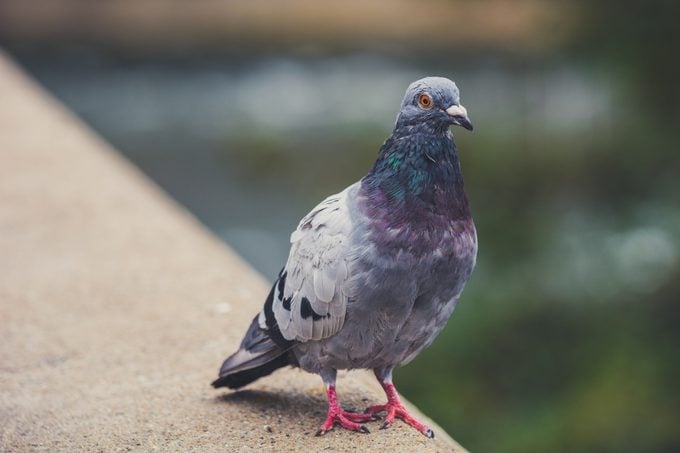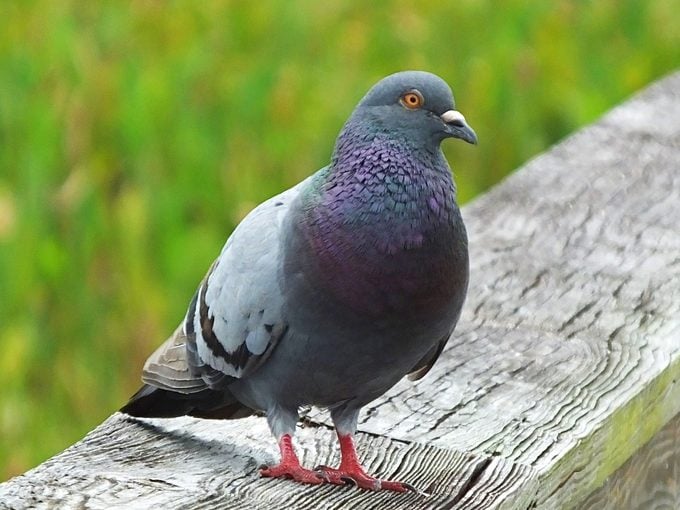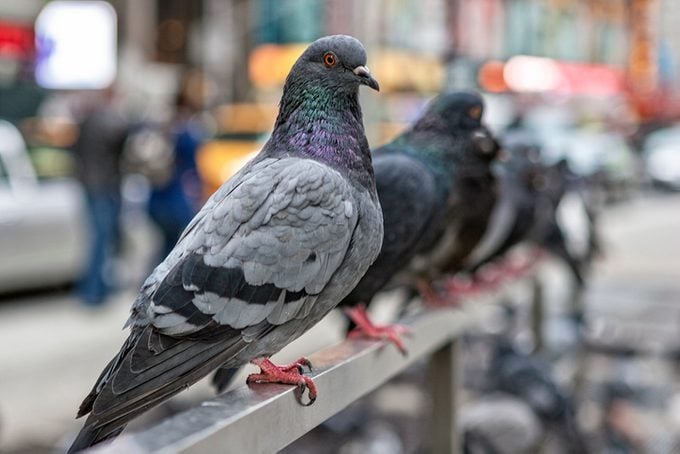Here’s Why Pigeons Are the Most Misunderstood Birds
Updated: Dec. 07, 2022
When it comes to pigeons, is the hate merited? We chatted with an expert about why you should rethink your opinion of the humble pigeon.
Our editors and experts handpick every product we feature. We may earn a commission from your purchases.
Pigeons Are Amazing Birds (Honest!)

As in any ecosystem, the bird world has its cherished species and those less popular. For every stunning photo of an indigo bunting or article extolling the beauty of warblers, there’s an ambivalent throwaway mention of sparrows, corvids or blackbirds. And then there are species many people actively dislike, such as Canada geese or brown-headed cowbirds. Unfortunately, that’s where the humble pigeon usually enters the conversation. But is that right? Should people harbor hatred for pigeons? We chatted with an expert about why these birds aren’t bad—they’re just misunderstood.
Meet more backyard birds with a bad reputation.
Pigeons Are “Obsolete Technology”

According to Rosemary Mosco, author of A Pocket Guide to Pigeon Watching: Getting to Know the World’s Most Misunderstood Bird as well as the popular “bird and moon” science and nature cartoons, pigeon hate is a relatively recent phenomenon. “It has to do with the fact that all of the reasons we domesticated them were no longer valid,” she explains.
In case you didn’t know, yes, we humans domesticated pigeons. In Rosemary’s words, the birds were “created and shaped” over thousands of years to be useful to us. They were once a food source; then, they carried messages during wars. The news agency Reuters got its start using pigeons to fill a communication gap between Aachen, Germany, and Brussels, Belgium. But as centuries passed, the need for pigeons in everyday life faded.
“They basically became obsolete technology, and they were also sort of seen as being in our face, so we started to vilify them in all sorts of different ways,” she says. Is that fair? Your stance on it might depend on whether you live in a city or in an area where pigeons tend to congregate…or how much pigeon poop you tiptoe through on the regular.
Check out 13 fascinating mourning dove facts.
Pigeons Are Smarter Than You Think

That said, there are reasons to appreciate these birds. While they’re not a native species, they’re also not invasive like European starlings. Because people tamed them to be comfortable alongside humans, they’re now only comfortable alongside humans. That means they tend to linger where we are, and they don’t displace any native species. “You won’t find them in the Redwoods pushing out the spotted owl or anything like that,” Rosemary says.
Even the most devoted birders might be surprised to learn pigeons are smart—well, in a way. (They’re not on the level of crows, ravens or parrots.) Rosemary mentions that since they’re domesticated, it’s easier to conduct scientific studies on them. That ease of experimentation has led to a variety of unique and occasionally strange findings, all of which prove they have some form of intelligence.
Rosemary brings up one study in which the birds learned to play ping-pong, another where they correctly distinguished between diseased and disease-free tissue, and yet another where they told the difference between impressionist and cubist paintings. “But if you switch their babies with another bird’s babies, they can’t tell,” Rosemary says. “It’s a different kind of intelligence, is how I like to think about it.”
Pigeons Mate for Life

Pigeons also have strong family units, generally mating for life unless a partner dies. Rosemary explains that because the pigeon’s strategy is to split childcare, both male and female pigeons sit on the nest. Both also produce crop milk, a vital food source for baby pigeons.
Learn about mourning dove eggs and baby mourning doves.
If You Want to Help Pigeons, Don’t Feed Them
Those who are already pigeon fans might wonder about the best ways to help them out. While pop culture is replete with characters scattering seed for pigeons in New York City parks, Rosemary recommends against following their example. As she notes, feeding them tends to expand their population. And if disease is a problem, that’ll only make the problem larger. “If they’re already sickly and have potential to spread disease to each other, and then you feed them, they can have more babies and be more tightly squeezed pigeons making each other sick,” she says. “It’s super complicated. I don’t think [feeding] is the best way to care for them, but it’s a tricky argument.”
Should you take down your feeders to stop bird flu?
Support Pigeon Rescue Groups
Instead, she brings up rescues as an option for those who’ve let pigeons into their hearts. “There are a number of really good pigeon rescues out there, and if you love pigeons, helping them out is a really good thing to do,” she says. “That’s what I’ve done, donated to pigeon rescues,” she adds.
More Reasons to Appreciate Pigeons

Why does Rosemary like pigeons? She says the reason is twofold. First, she mentions their looks. “The ones we see in the city are mutts,” she says. “They are a mix of breeds, so they’re pretty. You get different colors, which is really pleasant.” But she also mentions how closely pigeons intertwine with humanity: “I like them because they tell a story about human history and human movement, and the way we relate to animals.” Even if you’re still on the fence about pigeons, you have to admit there’s poetry in that.
Next, discover 15 common backyard birds you should know.




















